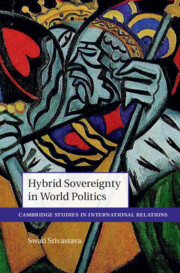Book contents
- Hybrid Sovereignty in World Politics
- Cambridge Studies in International Relations: 161
- Hybrid Sovereignty in World Politics
- Copyright page
- Dedication
- Contents
- Figures
- Tables
- Acknowledgments
- Introduction
- 1 Hybrid Sovereignty in International Theory
- 2 Ideal-Types of Public/Private Hybridity
- 3 Hybrid Sovereign Empire in the English East India Company
- 4 Contracting American Wars through Blackwater
- 5 Institutionalizing Markets through the International Chamber of Commerce
- 6 Shadowing for Human Rights through Amnesty International
- 7 Conclusions on Power and Responsibility in Hybrid Sovereignty
- References
- Index
- Cambridge Studies in International Relations
4 - Contracting American Wars through Blackwater
Published online by Cambridge University Press: 01 September 2022
- Hybrid Sovereignty in World Politics
- Cambridge Studies in International Relations: 161
- Hybrid Sovereignty in World Politics
- Copyright page
- Dedication
- Contents
- Figures
- Tables
- Acknowledgments
- Introduction
- 1 Hybrid Sovereignty in International Theory
- 2 Ideal-Types of Public/Private Hybridity
- 3 Hybrid Sovereign Empire in the English East India Company
- 4 Contracting American Wars through Blackwater
- 5 Institutionalizing Markets through the International Chamber of Commerce
- 6 Shadowing for Human Rights through Amnesty International
- 7 Conclusions on Power and Responsibility in Hybrid Sovereignty
- References
- Index
- Cambridge Studies in International Relations
Summary
This chapter illustrates the forms and dynamics of contractual hybridity in American wars using the case of Blackwater. Blackwater’s contractual hybridity was visible in its formal contracts with public funding. Contractual relations created power payoffs by deploying a contractor force for American wars and raised Weberian legitimacy dilemmas from limited contractor oversight and distributed accountability. Security contractors also disturb civilmilitary relations by posing as “civilian combatants” or “unlawful combatants,” depending on the preferred definition under international law. The chapter also follows bureaucratic debates on defining "inherently governmental functions" given contracting, which reveal the effort it takes to balance Idealized and Lived Sovereignty. By being attentive to formalized and publicized hybrid relations, the chapter thus wrestles with unique problems in sovereign governance that challenge the legitimacy of a sovereign authority that contracts itself.
Keywords
- Type
- Chapter
- Information
- Hybrid Sovereignty in World Politics , pp. 112 - 146Publisher: Cambridge University PressPrint publication year: 2022

